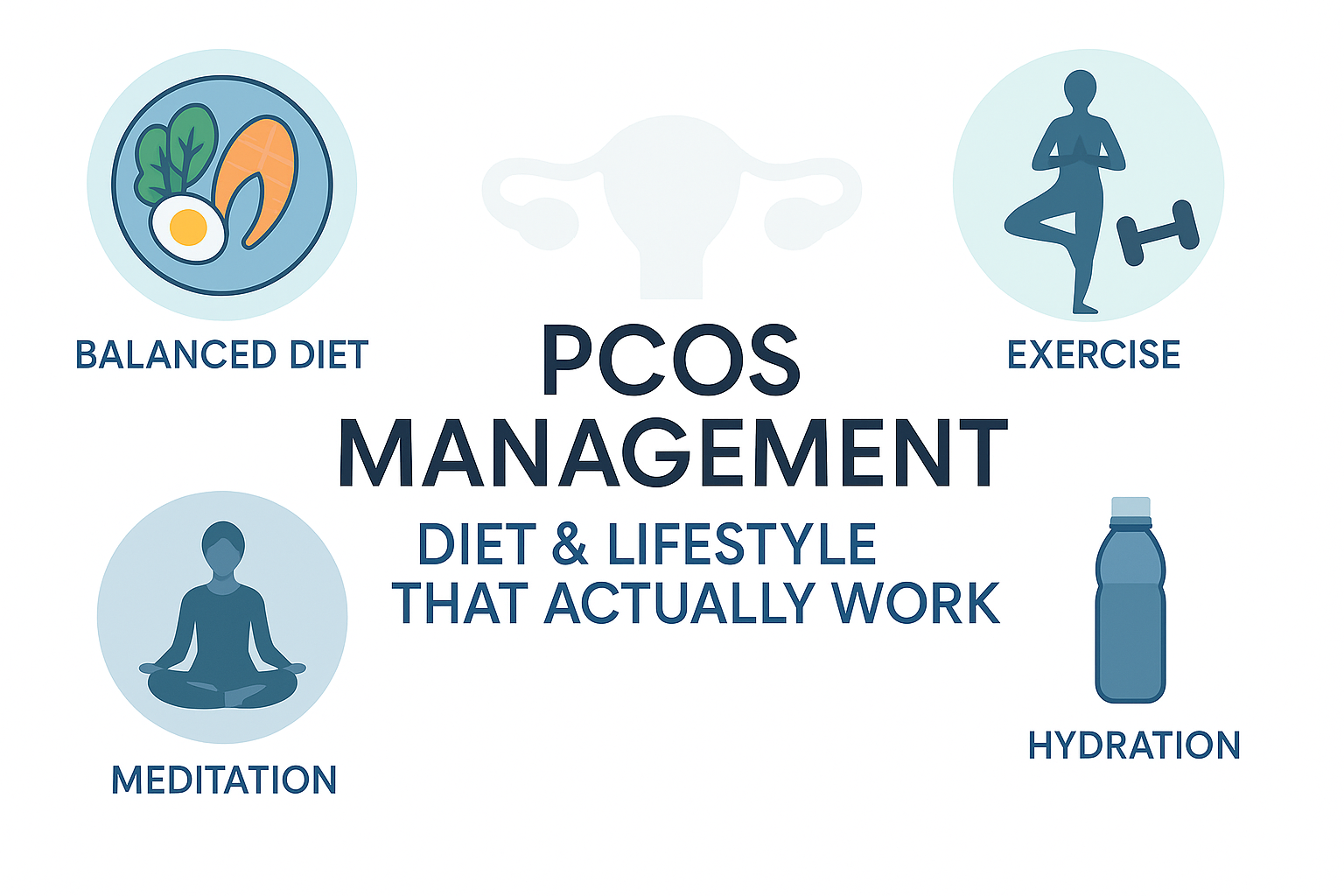In this blog, I’ll share what PCOS management really means, why so many women struggle with it, and how to reverse PCOS naturally using proven diet and lifestyle strategies that have worked for my patients.
What Is PCOS and Why Is Its Management So Important?
Polycystic Ovary Syndrome (PCOS) is a hormonal and metabolic condition that disrupts ovulation and affects insulin regulation, androgen levels, and overall hormonal balance. It’s estimated that 1 in 5 Indian women are affected.
The problem is not just irregular periods—it’s the long-term metabolic and reproductive consequences if PCOS is left unmanaged.
Common Symptoms of PCOS
Most women first notice PCOS because of changes in their menstrual cycle or body composition. The most common symptoms include:
- Irregular or absent periods
- Unwanted hair growth on the face, chest, or abdomen (hirsutism)
- Acne or oily skin that persists beyond teenage years
- Thinning scalp hair or hair loss
- Weight gain, particularly around the abdomen
- Mood swings, irritability, and fatigue
- Dark, velvety patches of skin (acanthosis nigricans)
💡 Patient Story: Priya*, a 31-year-old school teacher, came to Redial Clinic after years of dealing with irregular cycles, stubborn weight, and worsening acne. She had been prescribed hormonal pills repeatedly but stopped them due to side effects. Her main concern was, “Can I start managing PCOS without medication?” Within 5 months of a structured low-carb, high-protein healthy fat diet and targeted PCOS lifestyle changes, her acne reduced, periods became regular, and she lost 6 kg—all without synthetic hormones.
* Name changed for confidentiality
Long-Term Risks If Left Unmanaged
If management for PCOS is ignored, the risks go far beyond irregular cycles:
- Increased risk of type 2 diabetes due to chronic insulin resistance
- Higher chances of heart disease from elevated cholesterol
- Infertility and ovulation problems
- Sleep apnea from weight gain and hormonal imbalance
- Mental health challenges like anxiety and depression
- Increased risk of endometrial cancer due to prolonged unopposed estrogen
This is why PCOS management is not optional—it’s a necessity for long-term health.
Can PCOS Be Managed Naturally? Yes—Here’s How
Yes, managing PCOS naturally is possible in most cases if you address the root causes rather than only treating symptoms. This involves improving insulin sensitivity, balancing hormones, and reducing inflammation—without immediately resorting to medication.
Managing PCOS Without Medication
Managing PCOS without medication starts with identifying and removing triggers that worsen hormonal imbalance. The three main pillars are:
- Nutrition – A controlled-carb, high-protein and healthy fat diet reduces insulin spikes.
- Exercise – Strength training improves insulin sensitivity and hormone regulation.
- Lifestyle – Stress reduction and sleep optimization keep cortisol and androgen levels in check.
📌 In our clinic, 70% of women who follow this combined approach see noticeable improvements in cycle regularity within 3 months.
When Are Medications Necessary?
While lifestyle is the foundation, medication may be necessary if:
- Severe insulin resistance persists despite lifestyle changes
- Fertility treatment is urgent
- PCOS symptoms like acne, hirsutism, or irregular cycles are severely affecting life quality
Even then, medication works best in combination with natural strategies.
Diet Tips for PCOS Management That Actually Work
When women search for how to manage PCOS naturally, they often end up trying restrictive fads—gluten-free, dairy-free, or juice cleanses. The truth? None of these alone will fix PCOS. The real key is managing PCOS with diet by improving blood sugar control and providing hormone-supportive nutrients.
Foods to Include
For effective management for PCOS, include:
- Proteins: eggs, chicken, fish, paneer, tofu, Greek yogurt
- Low-GI vegetables: spinach, cucumber, cauliflower, zucchini, lauki, broccoli
- Healthy fats: desi ghee, white makkhan, virgin coconut oil, extra virgin olive oil
- Seeds: chia, flax, pumpkin
- Low-sugar fruits: berries, kiwi, avocado
💡 Tip: Every meal should have at least one protein source—this helps stabilise blood sugar and supports ovulation.
Foods to Avoid
For managing PCOS with diet, avoid:
- Refined carbs like white bread, pasta, biscuits
- Sugary drinks and packaged juices
- Deep-fried snacks in refined oils
- Excessively sweet fruits like mango and grapes
- Processed foods with hidden sugars
Best Eating Patterns
The best way to manage PCOS nutritionally is to:
- Limit snacking and eat 2–3 balanced meals per day
- Include 12–14 hours of intermittent fasting
- Keep meals protein-rich with healthy fats and low-GI carbs
Sample One-Day PCOS Diet Plan
| Time | Meal | Example |
| 8 AM | Hydration | Warm lemon water with a pinch of pink salt |
| 9 AM | Breakfast | 2-egg spinach omelette + cucumber salad |
| 1 PM | Lunch | Grilled salmon + sautéed zucchini |
| 5 PM | Snack | Greek yogurt + 20g blueberries |
| 8 PM | Dinner | Paneer stir-fry with broccoli + pumpkinseed sprinkle |
Lifestyle Habits for Better PCOS Control

Regular Exercise for PCOS
A consistent PCOS exercise routine helps improve insulin sensitivity and balance hormones. Aim for:
- Strength training 4-5 days/week
Sleep Hygiene
Lack of sleep disrupts hormones like insulin and cortisol, making PCOS management harder. Prioritize:
- 7–9 hours of sleep
Stress Management
PCOS stress management is crucial—chronic stress raises cortisol, worsening symptoms. Try:
- Meditation or deep breathing exercises
Avoid Endocrine Disruptors
Limit exposure to chemicals that mimic estrogen:
- Avoid BPA-containing plastics
- Use natural cosmetics and personal care products
- Switch to stainless steel or cast iron cookware
Read Also: Reversing PCOS: A Comprehensive Guide to Managing Polycystic Ovary Syndrome
Redial Clinic’s PCOS Reversal Program
Our best treatment for PCOS in Delhi combines:
- Custom low-GI, high-protein and healthy fats diet plans
- Strength Training
- Stress management techniques
- Regular cycle tracking and blood tests
The aim is to reverse PCOS naturally so that medications become unnecessary.
Supplements and Natural Aids for PCOS Management
Some supplements can support PCOS management:
- Vitamin D3 – Often deficient in PCOS, supports hormone regulation
- Omega-3 fatty acids – Reduce inflammation
- Inositol – Improves ovulation and insulin sensitivity
- Magnesium – Helps with stress and sleep
When to Seek Medical Help for PCOS
Signs You Need Medical Intervention
- No improvement after 6–8 months of lifestyle changes
- Severe acne or hirsutism
- Absent cycles for more than 3 months
How Redial Clinic Combines Natural and Clinical Approaches
We combine managing PCOS with diet and natural methods with necessary medical interventions when required—creating a holistic approach that works long term.
FAQs About PCOS Management
Q1. Can PCOS be managed without medication?
Yes, most women can succeed in managing PCOS without medication using diet, exercise, and lifestyle changes.
Q2. What is the best way to manage PCOS naturally?
A nutrient-rich low-carb, high protein and healthy fats diet, strength training, stress reduction, and proper sleep.
Q3. How long does it take to see results from natural PCOS management?
3–6 months for significant cycle and symptom improvements.
Q5. Which exercises are ideal for PCOS management?
Strength training
Q6. Does weight loss help in PCOS management?
Yes, especially reducing belly fat.
Q7. Are there supplements that support PCOS management?
Yes—Vitamin D, omega-3s, inositol.
Q8. Can PCOS be reversed completely?
Yes, with sustained PCOS lifestyle changes.
Q9. What foods make PCOS worse?
Refined carbs, sugary drinks, processed snacks.
Final Thoughts
PCOS management is not about temporary fixes—it’s about knowing how to manage PCOS from its root cause. By managing PCOS with diet, structured exercise, stress control, and better sleep, you can achieve hormonal balance and reverse PCOS naturally.
If you’re ready to take control, Redial Clinic, Green Park offers the guidance and support you need.
References
| No. | Source | Key Findings |
| 1 | Mayo Clinic | Highlights the role of insulin resistance and lifestyle changes in management. |
| 2 | NIH | Shows improved ovulation and reduced symptoms with lifestyle changes. |
| 3 | Journal of Clinical Endocrinology & Metabolism | Demonstrates benefits in ovulation and metabolic health. |
| 4 | American Society for Reproductive Medicine | Endorses strength training for hormonal balance. |






